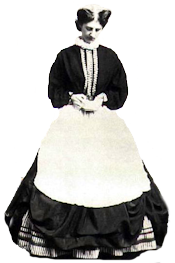Caroline Carson Woolsey to Abby Howland Woolsey.
Astoria, July 15th, 1863.
We left in such a hurry we had no time to leave directions for the servants, except to close the house early, and be very particular about fastening the doors and windows. . . . While driving out here we heard distinctly the cannon at Harlem. We have had no real trouble here from the mob, but were threatened last night and the night before. About two hundred men and boys, principally from Harlem and the upper parts of the city, were careering round the village. They went to Mr. M—’s, and made him come out and speak against the draft, and announced their intention of visiting Messrs. Wolcott, Woolsey and Howland among others. Groups of them were gathering in the afternoon as we drove through the village. Uncle Edward was a good deal excited as night came on, and had a man placed in the stable with directions to cut the horses loose should any alarm be made. Robert had his carriage, or rather his horses, harnessed and ready to pack the children in. Uncle Edward had a pile of fire-arms loaded and placed conveniently near the window. Aunt Emily put her rings on and her valuables in a safe place, and we pocketed our purses and laid Mother’s camel’s-hair shawls, which we brought with us, where we could easily seize them in case of sudden chill, caused by the draft! . . . But nothing turned up, and things have quieted down. The militia regiments are (five of them) coming home; the ryth has already arrived.
Hatty adds:—
One of the Ball & Black firm came the next morning to ask Uncle E. if he could hide some treasure on his place. He lives in 86th Street and his house had been threatened. Uncle E. said he might take his three or four trunks through the woods to the “black lodge,” but of course it was at his own risk, as no one was to be trusted on the place. They were all kept safe in Margaret’s hands, and he came back and got them in a few days. Isn’t it shameful that the fiends should have sacked Mrs. Gibbons’ house?—everything destroyed and all her little things carried off. Uncle E. is perfectly indignant and in a state of suppressed rage at the Irish, but he agrees with Aunt E. in not allowing a word said against them at table, or within reach of any of the servants’ ears.



